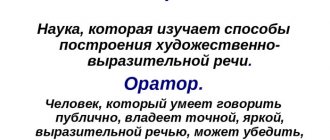Rhetoric
The formation of Russian rhetoric
In the Middle Ages, European rhetorical ideas penetrated into Russia through Poland and Ukraine. The development of Russian rhetoric has acquired special significance in the history of the normalization of the Russian literary language, in the formation of real social and communicative forms of communication between Russians.
In Rus', eloquence was called broadcasting, which developed mainly at public meetings - veche.
In addition to broadcasting, such types of eloquence as solemn (or praiseworthy), military and diplomatic speeches also developed.
The basis of Old Russian eloquence was folk traditions, and with the adoption of Christianity in 988, Byzantine and South Slavic models. Some texts have reached us that testify to the high culture of oral speech. Ancient Russian eloquence was characterized by such traditions as high respect for verbal skill, morally instructive pathos, the belief that the gift of speech is a great virtue, a gift from God; meekness, humility in public speech and conversation, high emotional intensity of appeals and appeals, complete absence of servility and flattery.
The first Russian manuals on rhetoric were written by Bishop Macarius (1617–1619), M.I. Usachev (1699), Feofan Prokopovich (two works - “De arte poetica” (1705), “De arte rhetorica” (1706). Their rhetoric textbooks were used in schools opened at churches and for training future clergy, in particular at the Kiev Theological Seminary. In the 17th–18th centuries, with the general development of culture and science, rhetoric became widespread. One of the most prominent representatives of the rhetorical tradition of that time was Prototopus Avvakum (1612–1682). was the ideologist and leader of the Old Believers movement in Rus'. We learn about the “word” of Avvakum from his work “Life” and from his correspondence with the noblewoman Morozova.
The formation of rhetoric as a scientific discipline is inseparable from the name of M.V. Lomonosov, the author of “A Brief Guide to Eloquence” (1748), which was reprinted twice during his lifetime (1759, 1765). This work presents a set of rules that were proposed to be followed in oral and written works on state, social and religious-philosophical topics. Lomonosov's rhetoric played a positive role in the further development of Russian oratory. Lomonosov combined rhetoric with the Russian language, with Russian tradition, and made it Russian science. In the subsequent period, no work appeared that was equal in scientific merit to Lomonosov.
At the end of the 18th - beginning of the 19th centuries, the rhetorical school of Russian academicians, and then the university school of eloquence, emerged. The most significant rhetoric of this time is associated with the names of academicians M.M. Speransky, A.S. Nikolsky, I.S. Rizhsky.
Speransky's rhetoric was written in 1792 and published in 1844 under the title “Rules of Higher Eloquence.” The book is dedicated to the art of church preaching. The rhetoric of Academician Rizhsky should be recognized as outstanding for its time. His “Essay on Rhetoric” was published in 1796 and was reprinted several more times. A special place in this book was occupied by issues of purity and correctness of Russian speech.
In the history of the development of Russian rhetoric, the period of the first half of the 19th century. turned out to be the most productive. Under the influence of the reform N.M. Karamzin, focused on rapprochement with the European tradition, a new stylistic concept of the literary language was being formed. This was reflected in the views on rhetoric in the works of N.F. Koshansky, A.F. Merzlyakova, A.I. Galich, K. Zelenetsky, etc. It was during this period that there were at least 16 manuals on rhetoric, and it was this period that is called the “golden age of Russian rhetoric.”
Special impulses for the development of rhetorical ideas in Russia were given in the 60s. XIX century, when the formation and formation of judicial eloquence took place, which was facilitated by the judicial reform of 1864. K. Arsenyev, A.F. wrote about the theory of Russian judicial eloquence. Koni, B. Glinsky, P. Sergeich, F.N. Gobber.
The first years of Soviet power saw a rise and interest in the spoken word. In 1918, the Institute of the Living Word was even created, but it did not last long. The content and form required by rhetoric were replaced by the revolutionary passion and conviction of the speaker.
In general, the art of public speech in the 20th century. in Russia is associated with the development of academic eloquence.
The intensive development of problems of domestic eloquence in recent years is due to the fact that society’s order for a thinking and speaking person is once again emerging. Particular attention is paid to persuasive speech and dialogic forms of communication.
Who is a speaker?
Before we begin to familiarize ourselves with the main material, let's first understand who the speaker is and what he does. If you turn to the dictionary of the modern Russian language, you can find several definitions of this term, each of which carries a certain amount of truth. For example, speakers today are people who study the art of eloquence at a professional level.
Also, many modern writers use this term in their works, presenting to the reader characters who have a certain gift of speech. In short, a speaker is a person who delivers a specific speech. In the following sections you will find the names of ancient Greek speakers and their works, which are also used by the modern generation.
Isocrates
A famous Athenian orator who enjoyed enormous popularity in Ancient Greece due to his famous judicial and political speeches. Isocrates came from a wealthy family, so his parents never had any problems with training young talent. In early childhood, the boy was interested in logic, philosophy, law and eloquence. All these sciences were very useful to him in life, since already at a young age Isocrates practiced his knowledge in public.
The speaker was always confident that the presentation of the speech should be as convincing as possible. To do this, he used a variety of arguments and compelling arguments in favor of his own opinion. As a master of eloquence, Isocrates is still considered one of the most authoritative figures in the history of this world. The popularity of this personality is evidenced by a huge number of excerpts from his speeches, which can be found without much difficulty on the Internet.
Isei
One of the ten most famous ancient Greek speakers is Iseus from Chalkis, who spent almost his entire life improving the art of eloquence. This person is also the author of several fateful speeches that were written specifically to order for legal proceedings. Today, feature films are made based on these very speeches, and actors build their fame on them.
Iseus was the mentor of Demosthenes, and he himself studied with the famous orator Isocrates. Today you can find 11 court speeches, which are extremely popular because they present everything in a very accessible language. Isei is considered much wiser than his mentor, but whether this is actually so is not for us to judge. Be that as it may, his speeches became a source of inspiration for many people who have now gained popularity.
Gorgias
The list of ancient Greek orators also includes Gorgias of Leontina, who made an invaluable contribution to the development of oratory and gained recognition among many people in 485 BC. An interesting fact is that Gorgias is considered one of the first orators who taught young men from rich families to think logically and speak beautifully. The “wisdom specialist” focused primarily on the issue of style.
It was he who introduced into speech such a concept as an oxymoron - a combination of concepts that are opposite in meaning. Gorgias's contemporaries called themselves sophists and continue to develop the art of eloquence, based on the teachings of the orator, to this day. Unfortunately, no documents or records of Gorgias have survived to this day, so all that remains is to adhere to various theories and hypotheses about exactly what sciences the ancient orator studied.
Demosthenes
An ancient Greek orator and part-time teacher of eloquence, who studied with Socrates and Plato for several years. Demosthenes’ speeches are also called “mirrors of character,” since the speaker was able to almost accurately recognize what was hidden in the soul of his interlocutor and choose the right words that he would like to hear. Demosthenes himself did not consider himself a rhetorician and did not like to decorate his words with invented expressions that an ordinary person could not perceive.
People loved the speaker for his fairly simple arguments and examples, which were imbued with wisdom and nobility. Also quite an interesting fact is that Demosthenes had a rather weak voice and short breathing, so there was always complete silence during his lectures so that the students could hear the teacher. By the way, perhaps you found the question in scanwords: “Ancient Greek speaker who stuttered - 8 letters?” If so, then Demosthenes was the answer.
Socrates and Plato
Perhaps the two most famous orators of Ancient Greece, whose works and statements can still be found today. According to Plato, who considered himself more of a scientist than an orator, the art of eloquence is based on knowledge of the truth, and not on the correct construction of sentences and the use of phraseological units. Only if a person develops comprehensively will he be able to understand the nature of human souls and begin to convey the word to them.
As for Socrates, the scientist’s most famous work is considered to be a dialogue called “Phaedrus,” in which the famous philosopher discussed the meaning of life with a young man named Fedor. The author adhered to the theory that before you begin to convey your opinion to your interlocutor, it is necessary to study it in detail, like any subject. After this, you can find the right levers, by pressing which you will inspire trust and respect in your interlocutor.
Pericles
The speech of the ancient Greek orator is a real performance that shows the wisdom and enlightenment of one person. However, such a spectacle becomes much more interesting if the speaker is also a political figure. Pericles was such a person. Constant communication with different people could not but affect the character and knowledge of the master of eloquence.
The flourishing of Athenian democracy is associated with the name of Pericles, so we can say without a twinge of conscience that it was this man who made an invaluable contribution to the development of the world that we know today. Thanks to Pericles and his students, Ancient Greece at one time achieved an unprecedented economic breakthrough and cultural development. It was this speaker who ordered the construction of famous buildings to begin: the Propylaea, the Parthenon, and so on.
Themistocles
Many believe that Themistocles does not belong to the ancient Greek orators, since he was a commander and statesman, but such arguments have little weight. Even in early childhood, the aspiring speaker, according to his peers, had a tendency to participate in social activities. Even during leisure hours, he enjoyed various educational activities and improved in everything.
Therefore, his teachers constantly said that nothing mediocre would ever come out of the boy, but something great. However, the young man never relied on his natural talents and improved his skills. Over time, Themistocles became a great and renowned orator who, in addition to eloquence, also explored various fields of science, such as philosophy. Most of his works were lost as Themistocles assumed leadership positions in 493 BC.
Socrates
The great ancient Greek philosopher, who also became the founder of dialectics. We already mentioned him in the second section of our article, but such an authoritative personality deserves special attention, and not comparison with other famous speakers. Socrates expounded his teachings mainly among his students, who were Plato and Xenophon. Most of all he loved philosophy, but oratory was given to him with amazing ease. By the age of twenty, he had acquired such wisdom that many elders could envy. For all subsequent eras, this person became the embodiment of the ideal of man.
The speaker compared his teaching methods to “the art of an old grandmother.” That is, he asked the students a series of questions, to which a critical attitude was expected on the part of the teacher. After the answers, he asked a few more additional questions, and so on until the student was in a hopeless situation. Thus, Plato learned to answer the most difficult questions, and Socrates gained his fame. It is also worth noting that this speaker did not write down his thoughts, but preferred to keep everything in his mind, so today you can find relatively little information about the activities of this sage.





